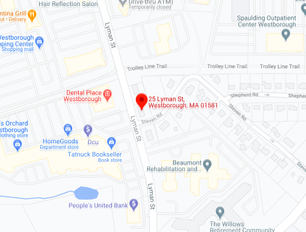Clinician Spotlight: An Interview with Shawn McGuirk, LMHCWelcome to the fourth installment of Clinician Spotlight, a series where I sit down with some of our wonderful therapists for a cozy conversation about work, mental health, and many life tidbits in between. This month, I had the opportunity to speak with Shawn McGuirk, LMHC. Shawn combines mindfulness with Acceptance and Commitment Therapy and Cognitive Behavioral Therapy in his work with both college students and post-college aged adults. Shawn discussed what mindfulness means to him, how even summer can be tough on mental health, and his overall passion for the work.
Lauren: Thank you for chatting with me! How long have you been with Castlebrook and what is your therapeutic background? Shawn: I started at Castlebrook in the Fall of 2020. As for my therapeutic journey, I worked in higher education for a long time, but held a masters degree in counseling and psychology and wanted to eventually use it. While I became a therapist a little later in my career, I’ve been in the mental health field for 11 years now. I got licensed in 2019 and here I am doing what I love doing! Lauren: Congratulations! What made you want to make the switch? Shawn: I’d been in higher ed for a long, long time working at different colleges and universities. It was my 40th birthday and I thought to myself, “If I don't do this now, I’m never going to do it.” Lauren: Speaking of higher education, I know that you also work at Clark University in a clinical role now. Shawn: Yes, I work at Clark in the counseling center and just finished my fifth year. Lauren: What do you feel is the main difference between university counseling and private practice? Shawn: There are obviously a lot of similarities such as people struggling with depression, anxiety, and mood disorders. However, I find that one main difference in working with young adults in a college setting is level of insight. When you’re a college student, especially a first and second year, you’re still trying to figure out, “Who am I? What do I want to be? What do I want to do?”, and so there are some existential issues that go along with that. Whereas in private practice, I tend to work more with post-college aged adults. There are a lot more relationship based issues such as how you’re relating to yourself, spouse, family, job, and so forth. Lauren: I like that you get the best of both worlds. You work with people that may have a more established sense of self and then with people who are at the beginning of that journey. Shawn: Yes, and prior to Clark, I worked at a nonprofit in Fitchburg. I did individual therapy, family therapy, couples counseling, home-based therapy, and I did work with young kids for a period of time, but discovered that it wasn’t in my wheelhouse. I am much better with adults so that’s what I stick to. Lauren: That’s great that you got such an array of experience! It’s just as good to figure out what you don’t want to do. Shawn: Yes! When I started, I really wanted the full experience to figure out what I liked and what I was good at. I'm very fortunate because I got that experience. I was working with everyone from older adults to four year old kids. I give people a lot of credit who work with kids that young! Personally, I love working with adults. They are often genuinely looking for help with their emotional state, are more insightful, and are open and willing to be somewhat vulnerable. You really have to take a leap of faith to be vulnerable and willing to put in the work of therapy. I find that my relationship with my clients is strengthened when they’re willing to try. Lauren: So, you’re the first clinician I’m interviewing in the summer! It’s well known what kind of issues clients might go through in the winter, like seasonal affective disorder, but have you found that working with clients in the summer brings some unique challenges for them? Shawn: Actually, yes. More family related issues as families are spending more time with each other. I see a little less anxiety and depression and a little more communication difficulties with significant others and family. Lauren: That makes sense. I think sometimes summer can also be tough because people think they should feel a certain way. The sun’s out, the weather is beautiful, why am I not happy? Shawn: That’s a really good point and in fact, I’ve met with client’s recently that have had similar issues. They have all of these outwardly positive things in their lives, including the nice weather and outdoor activities, so they question why they’re not happy. Chasing happiness is what causes unhappiness. Lauren: The chasing happiness piece reminds me of Acceptance and Commitment Therapy (ACT). Is that a modality that you work with? Shawn: Absolutely. I’m a big proponent of ACT. I also do CBT and mindfulness work. For me, it’s important to recognize the connection that exists between thinking and emotions. We experience certain emotions due to the thoughts we’re having, then we talk to ourselves in a way that aligns with those emotions and thoughts. The acceptance piece comes in when we are not looking to make judgements on or evaluate these thoughts and emotions, but are just accepting what is. I do quite a bit of that. Lauren: How did you hone that style? Shawn: Honestly, it was my own therapy. His style really resonated with me and I was able to make it my own to fit my personality, style, and how I personally think about therapy. When you’re talking about mindfulness, anybody can benefit from that. I combine ACT, mindfulness, and some CBT, that’s my triangle. Lauren: I know some people reel back a bit at the mention of mindfulness just from what they’ve heard or seen in popular media. How would you describe mindfulness to somebody who is hesitant? Shawn: Interestingly enough, this just came up with a client. They said it’s something they’ve tried before and weren’t sure about. I try to educate as much as I can as far as what it actually is. Often, people think it’s just meditation and that they can't clear their mind and be still. But that's not what it’s about. Mindfulness is about being able to focus on what’s going on in this moment. I often will use the Lao Tzu quote, “If you are depressed, you are living in the past. If you are anxious, you are living in the future. If you are at peace, you are living in the moment.” So how do we go about honing that focus? How do we train the mind to come back to this moment? Lauren: A more general question, and something I’ve asked some of the other clinicians too, a lot of people are hesitant to start therapy at all. One goal of this spotlight series is to humanize therapy and therapists in order to make it less nerve wracking to start. What would you want potential clients to know about therapy? Shawn: More than anything, I would like people to know that it’s a conversation. We’re having a conversation about you. We’re going to talk about you and whatever it is you feel like talking about. We all need somebody to talk to from time to time and that’s all this is. You talk to me about things that are on your mind, I’ll ask you questions, you can ask me questions, and I’ll try to answer as honestly as I can. I can appreciate that someone coming into therapy is uncertain, a little scared, or intimidated. I get that. It’s my job in part to foster relaxation and comfortability. I like to think of it as the client driving the bus. I’m riding shotgun with a map, and I’m trying to direct us as best we can to the place we both want to go. Lauren: That’s a great metaphor, because both the driver and the map reader can make mistakes. It kind of puts you in a non-expert role. Shawn: For sure. If we end up taking a wrong turn somewhere, we’ll backtrack or take another turn. We’ll eventually get to where you want to go, even if it takes some time or is uncomfortable. Lauren: So, what do you do for fun? We tell clients all the time that it’s important to have hobbies and coping skills, what are yours? Shawn: I meditate a lot which is really beneficial for me, I exercise, and I read. For reading, it’s mostly nonfiction, spiritual types of books. Also, my kids are older, but I try to communicate with them as much as possible, which is not always easy. My oldest just left for the peace corps! I love being a father and when I can connect with my three children, that means everything to me. Lauren: Is there anything that you were hoping to share that I didn’t ask? Shawn: I love my work, I consider it a real privilege to do what I do. I am really grateful to get the chance to do it on a daily basis. When you think about the work we do and how absolutely amazing it is, you can’t get any better than that.
0 Comments
Your comment will be posted after it is approved.
Leave a Reply. |
Archives
May 2025
Categories |
Mission Statement
Castlebrook Counseling Services, Inc. is a group of private practice clinicians with a shared goal of strengthening our community by providing therapy and clinical support designed for children, adults, and families to successfully meet life’s challenges.
 RSS Feed
RSS Feed

